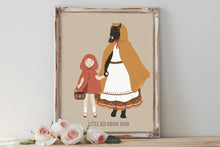

"Little Red Riding Hood" is a European fairy tale about a young girl and a Big Bad Wolf. Its origins can be traced back to the 10th century to several European folk tales including one from Italy called The False Grandmother.
The story displays many similarities to stories from classical Greece and Rome. The dialogue between the Big Bad Wolf and Little Red Riding Hood also has its analogies to the Norse Þrymskviða from the Elder Edda, the giant Þrymr had stolen Mjölnir Thor's hammer and demanded Freyja as his bride for its return. Instead the gods dressed Thor as a bride and sent him. When the giants note Thor's unladylike eyes eating and drinking Loki explains them as Freyja's not having slept eaten or drunk out of longing for the wedding. A parallel to another Norse myth the chase and eventual murder of the sun goddess by the wolf Sköll has also been drawn.
The story had as its subject a village girl of the country being deceived into giving a wolf she encountered the information he needed to find her grandmother's house successfully and eat the old woman while at the same time avoiding being noticed by woodcutters working in the nearby forest. Then he proceeded to lay a trap for Red Riding Hood. Little Red Riding Hood ends up being asked to climb into the bed before being eaten by the wolf where the story ends. The wolf emerges the victor of the encounter and there is no happy ending.
Charles Perrault explained the 'moral' at the end of the tale so that no doubt is left to his intended meaning:
‘From this story one learns that children especially young lasses pretty courteous and well-bred do very wrong to listen to strangers And it is not an unheard thing if the Wolf is thereby provided with his dinner. I say Wolf for all wolves are not of the same sort, there is one kind with an amenable disposition – neither noisy nor hateful nor angry but tame obliging and gentle following the young maids in the streets even into their homes. Alas! Who does not know that these gentle wolves are of all such creatures the most dangerous!’
A sexual analysis of the tale may also include negative connotations in terms of rape or abduction. However many revisionist retellings choose to focus on empowerment and depict Little Red Riding Hood or the grandmother successfully defending herself against the wolf.
Such tellings bear some similarity to the "animal bridegroom" tales such as Beauty and the Beast or The Frog Prince but where the heroines of those tales revert the hero to a prince these tellings of Little Red Riding Hood reveal to the heroine that she has a wild nature like the hero's. These interpretations refuse to characterize Little Red Riding Hood as a victim, these are tales of female empowerment.




